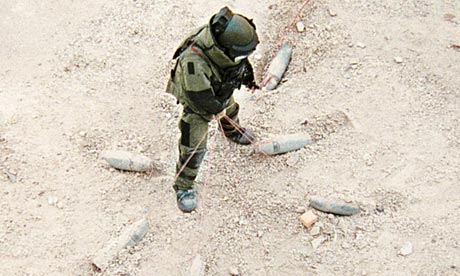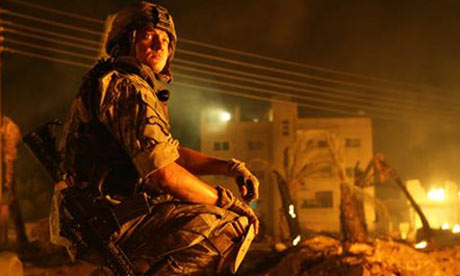Caution: this article contains spoilers and reveals plot details about The Hurt Locker.
It's a sad commentary on Hollywood that Kathryn Bigelow is not merely the first female to win an Oscar for best director but just the fourth woman to even be nominated. So not only does she deserve the award but it's overdue. It's just a shame that The Hurt Locker – a taut thriller, beautifully filmed and edited – has such deep flaws that it won't be remembered as one of the great Oscar winners.
Of course, you can't please everyone and 2009 wasn't a vintage year for American cinema. But there's an small irony that Bigelow is lauded for being the first woman to win "best director" for a movie that has scarcely any speaking roles for women. The Hurt Locker is a very "male" movie in that sense. Maybe it's progress when a female director makes films on subjects that aren't traditionally "feminine" – although since there have been so few women nominated for the accolade – Jane Campion for costume drama The Piano; Sofia Coppola for her bildungsroman Lost In Translation; Lina Wertmuller for the obscure and unsettling Pasqualino Settebellezze – it's hard to say what such female movies might be.
The deeper flaw in Hurt Locker is that it has nothing to say about its setting. This is, after all, a contemporary film, set in Iraq. Yet it feels curiously detatched. It could just as easily have been set in any modern theatre of battle, from the second world war Germany to Korea to Vietnam to Afghanistan. The fact that it's in Iraq is rendered irrelevant – and this political neutrality might account for its success at the Oscars, where "political" films tend to do badly among the Academy's voters.
Very few Iraqi characters get a chance to be heard in The Hurt Locker. Only two get to speak in intelligble sentences, and no subtitles are provided for the others. Instead, the mass of Iraqis are portrayed as largely mute, anonymous and threatening figures, seen away in the distance. Mainly Iraqis are just a danger to be feared, sometimes firing weapons and planting bombs but more often being shouted at or stopped, pushed or pointed at with weapons. One small, quick-witted boy gets the bulk of the Iraqi dialogue, when he strikes up a friendship with James. He doesn't get a name, just a self-bestowed nickname: Beckham. And Beckham literally becomes dangerous when James comes to believe that the boy's dead body has been made into a "body bomb," a corpse wired as a booby-trap. It's commentary of some sort that after James carries "Beckham" outside there is an explosion from an IED that kills Cambridge, the only US military figure who engages sympathetically with Iraqi civilians. Later we discover that Beckham is alive and that James misidentified the boy's body – and James, in shock at the discovery, ignores him, leaving Beckham as confused as the viewer.
Of the other Iraqi characters, only one even merits a name: Professor Nabil, who may or may not be Beckham's father, who cryptically welcomes James as a member of the CIA, but with whom further dialogue is cut off by the appearance of "Nabil's wife", who attacks James and sends him fleeing out into the dark and dangerous streets of Baghdad – although James arrives back unharmed and receives rougher treatment from his wary comrades guarding the base. The other characters that James speaks with are, respectively, "DVD seller" and "Black suit man". Neither of them get much to say, although "Black suit man" is the subject of a heart-rending scene where James struggles to dismantle a bomb vest which has been locked on to the man. All othes are engaged with at the point of a gun.
The immediate contrast is with the excellent and markedly political Three Kings, also set in Iraq but after the first Gulf War, and more pointedly with The Battle of Algiers, the brilliant realist drama which manages to engage the viewer's sympathy despite the bleak cycle of violence into which it resolves. In doing so it personifies the character of Colonel Mathieu as one of the great paradoxes of post-war cinema: "Should we remain in Algeria?" is the question Mathieu poses. "If you answer yes, then you must accept all the necessary consequences." The Hurt Locker has no time for consequences.
There is much about The Hurt Locker that is confusing. That may be the point, of course, that war in such circumstances is both confusing and dangerous – as with the HBO mini-series Generation Kill, which The Hurt Locker resembles. Generation Kill had multiple, overlapping political narratives, and as a result was sprawling and very difficult to follow. The Hurt Locker is much more tightly focussed and successful, but any insights into America's involvement in Iraq won't be found there. In that sense The Hurt Locker is empty. Its general themes – that war is hell, that the soldiers on the ground were perplexed and isolated, sometimes frightened and sometimes exhilarated by combat – are familiar ones. We discover by the end that Sanborn can't take it any more but that James is addicted to the adrenaline.
Does The Hurt Locker need a political narrative? No, it doesn't: it's just a movie, about the psychosis of one character, James. But it seems empty in sitting outside its immediate context. Can we make a movie set in Iraq that is not about Iraq? Of course. But it seems strange. Still, Jane Austen managed to populate her novels with admirals, captains and soldiers and never once mention the war against Napoleon that she lived through and they were fighting in. Is it a coincidence that The Hurt Locker's main character is named William James? An earlier William James, brother of the novelist Henry James, was a founder of modern psychiatry and the author of an essay, The Moral Equivalent of War, which captured perfectly the continued existence of The Hurt Locker's leading man:
Modern war is so expensive that we feel trade to be a better avenue to plunder; but modern man inherits all the innate pugnacity and all the love of glory of his ancestors. Showing war's irrationality and horror is of no effect on him. The horrors make the fascination. War is the strong life; it is life in extremis; war taxes are the only ones men never hesitate to pay, as the budgets of all nations show us.










